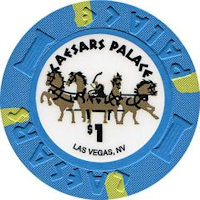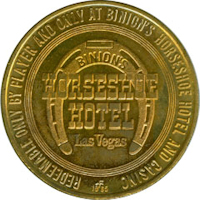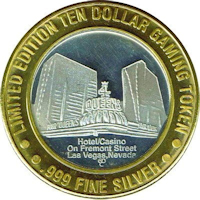As collectors we spend a lot of time and money acquiring our items without giving much thought on how we (or our heirs) will eventually dispose of them. On social media and other message boards we often see posts along the lines of “I have these casino chips from my parents, I’m not sure what they are worth and how to sell them”.
This page will help you understand various options and the pros and cons of each.
Please note:
- The mentioning of any specific products or websites do not constitute an endorsement by the CCA. These are presented as references for members and the public.
- While the notes below often refer to casino chips, the advice generally applies to any other casino collectibles such as tokens, silver strikes, coin cups, napkins, slot cards, room keys, swizzle sticks, etc.
What do I have?
Especially for non-collectors, the first thing is to understand exactly what do I have? The 3 most common items collected are:
Casinos Chips - these are small, round discs that are often made of hardened clay-like material. They often have a value on them and the name of the casino they were used at. An example:

Tokens - these are round metal ‘coin-like’ items that have a denomination (often $1) and the name of the issuing casino. Example:

Silver Strikes - these are special medals often with silver content and issued in round plastic containers. They were often won in special slot machines in select casinos. Example:

The First Big Decision - Who Sells Them?
The first major decision you need to make is who will be selling them? Most people prefer to sell the items themselves; this will maximize the money received for them, but it will also require the most effort and time. Other options:
- Consignors - act as your agent to sell items. They will document the item, set a price & advertise the item. Once they find a buyer, they will collect the money and ship the item. In exchange for this service, they will keep a predetermined percentage of the sale, often in the 30% range.
- Auctions - there are several auctions available for higher value items. You send the item to the auction house, they catalog the item, run the auction, collect the sale and ship the item. In exchange they keep a percentage of the final sale price and sometimes collect a percentage fee from the buyer. 4 of the biggest auctions currently are Chip Chat (run by Doug Saito), the annual CCA club auction, Heritage Auctions and Potter & Potter Auctions.
So you’re going to sell them yourself - what’s next?
If you have decided to sell them yourself the next 2 steps are:
Understand & document what you have - spend time researching what items you have. An excellent first place to start is the CCA’s ChipGuide. This site documents all known casino chips and most other items. Start by trying to find the city/state and the casino that issued the item. Often having a list in a spreadsheet like Excel or Google Sheets is handy. Also photograph the items you have; when you are trying to sell people want to see the items themselves. For casino chips it's often very handy to have the chips in groups of 20-30 at a time, this allows buyers to see the details:

Understand Value - this is one of the toughest steps. The value of any collectible is the price that a buyer and seller will agree to at any one moment. Usually, the supply and demand of an item will determine the value of an item, but other factors will also come into play. Is the item the last in a series that a collector needs? That collector may be willing to pay over ‘market’ value. Does the seller need to liquidate a collection at ‘any price’? That may drive down the value.
Where do you find the value of an item?
- Guides - At the writing of this article only one published guide maintains current values, and those are only for Nevada chips: The Chip Rack.
- Online - Stores selling items may give you an idea of the value of an item. The current big 3 on-line stores with a wide range of inventory are Marlow Chips, Spinetti’s and All-Chips. Make sure you are only looking at prices for items in-stock.
- Past eBay Sales - Search for the item on eBay and see what they have sold for recently (make sure you only consider SOLD items; prices on items for sale now can be anything selling dreams up, SOLD prices are what people were willing to actually pay.
- Historical Pricing - One challenge with eBay is that it only goes back for a limited amount of time (30 days as of this writing). Worthpoint is a subscription service that allows you to see auction sales going back years from eBay and many other auction services.
Next step: how do you group?
The next step is to decide if you want to sell:
- each item individually
- in lots of items grouped together
- all at once
Selling each item individually will net the highest value but will take the most amount of effort. Selling in lots is less work but since most buyers don’t want everything in a lot, you will have to discount the value to entice them. Selling everything at once is the easiest, but you will have to discount the most to entice a buyer.
Next: where do you sell?
There are 3 main ways to sell items yourself: Directly to collectors, to dealers and through self-directed auctions (like eBay).
Directly to Collectors - selling directly to collectors allows you to keep the entire proceeds of the sale (minus any fees for payment processing). The best way to find collectors is to post to on-line communications platforms directed to casino items:
Dealers - selling to dealers is usually a simple transaction, but it comes at a cost. Dealers run a business, need to make a profit, so they need to buy at wholesale prices. Often dealers will pay 50% or less of ‘market value’ for items. There are too many dealers to list, but posts to the above collectors' platforms will often yield suggestions. You can also find dealers advertising in the CCA magazine & the annual CCA Show magazine. You can also find dealers at chip shows such as the annual CCA convention.
Self-directed auctions and direct sales (like eBay & Etsy) - running auctions & sales on platforms like eBay & Etsy give very wide exposure to items. Etsy operates as a store front where you can post items for sale. While it started out featuring hand-crafted items, it now includes vintage wares also. eBay allows sales at both set prices as well as auctions. It has 104,000 auctions of individual chips in a year, with tens of thousands of buyers. As of this writing there was no cost to list your items, but eBay does take a percentage of the final price plus other fees.
One more consideration, even if you aren’t planning on selling….yet
One aspect all collectors should consider, even if they aren’t planning on selling yet: instructions for heirs on whom to contact. Many times, families who are left to dispose of collections have no idea where to turn first. While they may have a vague understanding of the club and hobby they really don’t know who to trust. A simple note with contact information of a trusted hobbyist gives them a starting point on their journey.
Looking to do good with your collection? Consider donating to the Casino Collectibles Association (CCA)
The CCA is a registered 501c3 educational organization. Donations to help the club are tax deductible to the extent of the law. While we cannot provide an estimated value of the donation (that is up to the donor), we can provide you with a receipt.
Donations are used to help keep costs for the club down and provide additional benefits to its members and the hobby as a whole. If you are interested in making a donation, please can contact the CCA Vice President who will be able to make arrangements.
Looking for more information about collecting?
If you found this page and are looking for more information about the hobby, the Casino Collectibles Association (CCA) can help. Our free resources including Casino Collectibles for Newbies are a great place to start. Want to learn more about the CCA, visit our About Us page for more information.
Ready to join? Check out our membership options.